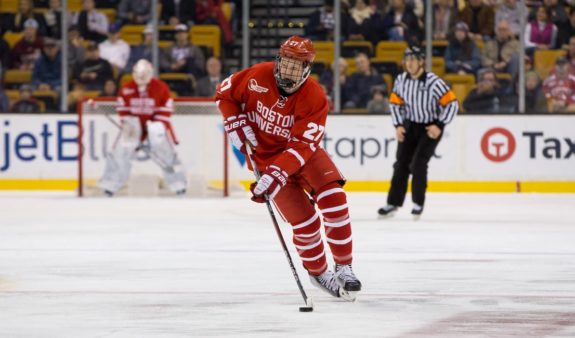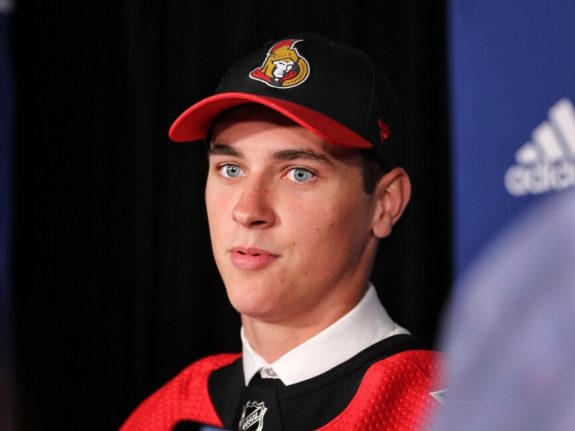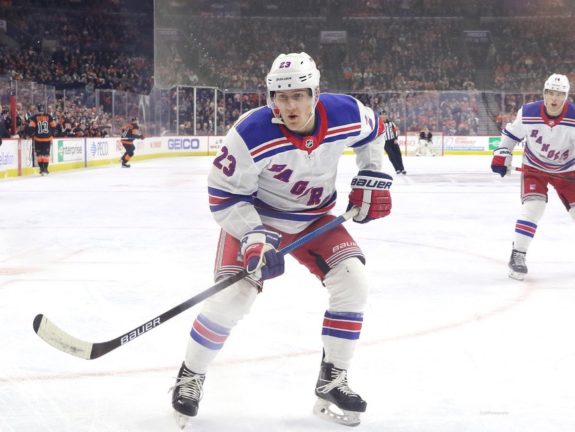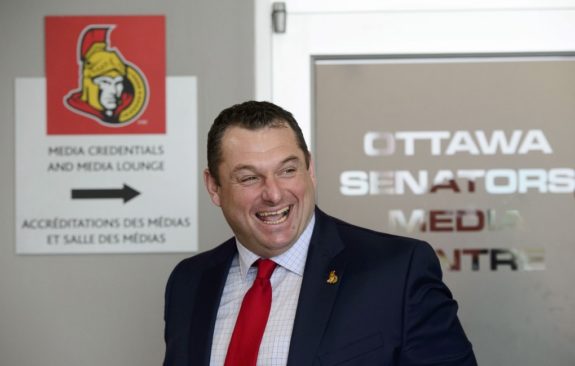The Ottawa Senators and the NCAA have long been connected. Many current Sens have spent time and developed their skills in the American college system. Why is it that the team has been so fond of these players? I believe that the Sens are so enamoured with the NCAA because it fits so well with how the franchise develops their prospects, and how they run their NHL system.
The Sens Love The NCAA
On the Senators’ current roster, six players have played in the NCAA. Of these players, the most notable names are Brady Tkachuk, Ron Hainsey and Mark Borowiecki.

(Rich Gagnon/Boston University)
Hainsey and Borowiecki both spent multiple years at their alma matters, Hainsey spent two years at the University of Massachusetts at Lowell from 1999 to 2001. Borowiecki played three years at Clarkson University from 2008 to 2011. Tkachuk is the outlier here, only spending one season at Boston University in 2017-18.
The NCAA Prospects in the Senators’ Organization
The franchise has also been well known to draft players from the NCAA. With the Senators’ deep prospect pool, many of their top prospects are either in the NCAA, or alumni being developed in the AHL. The team currently has eight prospects currently playing college hockey. The most notable of them being Jacob Bernard-Docker and Shane Pinto at the University of North Dakota. While they are currently having fantastic collegiate careers, there is no reason to believe that they will be brought to the NHL until they are ready.

(Amy Irvin / The Hockey Writers
This follows a pattern that the team has followed for years. It’s why Tkachuk’s path to the NHL was so surprising. While it has obviously worked in his and the teams’ favour, it breaks from tradition. The purpose of having the NCAA pipeline is to allow prospects to develop and not worry about using up a contract from the 50 allowed per team. Of course, the Senators do take a risk when utilizing the NCAA.
Related: 6 NHL Teams You Might Have Forgotten
The ability for a graduated player like Jimmy Vesey to enter free agency when he graduates, or where players like Adam Fox can put their teams into a corner with trade demands is an obstacle. While these problems are there, the Sens have not really been one to experience them.
Why the NCAA Translates Well to the NHL
For all the social issues with the NCAA, their hockey programs have been a fantastic feeder program for the Sens. The talent of division one hockey, while obviously the most important factor, is not the biggest reason why the Sens love the NCAA. In college hockey, there is a big difference between the sizes, skill, and maturity of their players. An 18-year-old, 5-foot-9 winger fresh out of high school could be up against a 21-year-old, towering six-foot player who has been playing for two to three years.

While this happens in other leagues, those in the NCAA are usually less naturally skilled than their counterparts playing in the Canadian Hockey League and in Europe. They make up for this with their physicality, as those who take the college hockey route are often bigger and stronger. With the game being more physical in the States, players learn how to play the game tougher then they would in other leagues. This is where the Senators come in, as the team has always played a physical game, and having players who know how to play one is incredibly useful.
The NCAA Benefits the Ottawa Senators
Folding rookies into a lineup isn’t easy, especially for a young team like Ottawa. When their prospects do eventually reach the NHL, having them understand how to play in a specific system is very important. Even if they go to the AHL’s Bellville Senators before their NHL debuts, having that experience in the NCAA is great for the transition to the professional game.

DJ Smith’s current system (love it or hate it) is built for more physical hockey. With many new prospects inevitably making the trip north, Smith will be thrilled with their ability to fit in. Another added benefit of the NCAA is the seemingly consistent ability for their alumni to play long careers in the NHL. Hainsey has played over 1,000 games in the league; Borowiecki, while he didn’t get consistent playing time until the 2014-15 season, he has been a very durable piece for the Sens.
Related: Ranking the Senators’ 1990s First-Round Picks
As long as the Senators continue to farm from the NCAA, they will benefit from lower-key players that the rest of the league may ignore. There may be less pure skill and offensively gifted players in the American college system, but the Sens can still find value. The team already has a deep system filled with those kinds of prospects, but every team needs to fill the bottom forward lines and bottom pairing defensemen with depth. The kinds of players from the NCAA are now, and will always be, a valuable asset to the Ottawa Senators.